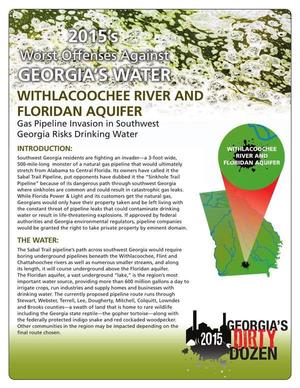WWALS submitted Sabal Trail again this year,
 with even more support throughout the state for sending that fracked methane invader back down its Sinkhole Trail to Houston, Texas.
with even more support throughout the state for sending that fracked methane invader back down its Sinkhole Trail to Houston, Texas.
Brad McEwan, Albany Herald, 4 November 2015, Proposed Sabal Trail pipeline makes water coalition Dirty Dozen: Georgia Water Coalition says Sabal Pipeline risky for SOWEGA,
According to the Dirty Dozen report the biggest concern voiced by the coalition, which is a consortium of 228 conservation and environmental organizations, hunting and fishing groups, businesses and faith-based organizations, is that the proposed pipeline could negatively impact the Withlacoochee, Flint, and Chattahoochee rivers, as well as smaller streams and creeks, along with the Florida aquifer, which is considered the region’s most important water source.
The GWC writeup mentions the very recent EPA letter FERC tearing apart Sabal Trail’s claims and FERC’s process and the letter from four Georgia Congressmen to FERC.
The Georgia Water Coalition Dirty Dozen 2015, #11: Withlacoochee River and Floridan Aquifer: Gas Pipeline Invasion in Southwest Georgia Risks Drinking Water, or Travails of the Sinkhole Trail:
INTRODUCTION:
Southwest Georgia residents are fighting an invader — a 3-foot wide, RIVER AND 500-mile-long monster of a natural gas pipeline that would ultimately stretch from Alabama to Central Florida. Its owners have called it the Sabal Trail Pipeline, put opponents have dubbed it the “Sinkhole Trail Pipeline” because of its dangerous path through southwest Georgia where sinkholes are common and could result in catastrophic gas leaks. While Florida Power & Light and its customers get the natural gas, Georgians would only have their property taken and be left living with the constant threat of pipeline leaks that could contaminate drinking water or result in life-threatening explosions. If approved by federal authorities and Georgia environmental regulators, pipeline companies would be granted the right to take private property by eminent domain.
THE WATER:
The Sabal Trail pipeline’s path across southwest Georgia would require boring underground pipelines beneath the Withlacoochee, Flint and Chattahoochee rivers as well as numerous smaller streams, and along its length, it will course underground above the Floridan aquifer.
The Floridan aquifer, a vast underground “lake,” is the region’s most important water source, providing more than 600 million gallons a day to irrigate crops, run industries and supply homes and businesses with drinking water. The currently proposed pipeline route runs through Stewart, Webster, Terrell, Lee, Dougherty, Mitchell, Colquitt, Lowndes and Brooks counties—a swath of land that is home to rare wildlife including the Georgia state reptilegthe gopher tortoise—along with the federally protected indigo snake and red cockaded Woodpecker. Other communities in the region may be impacted depending on the final route chosen.
THE DIRT:
Spectra Energy’s Sabal Pipeline poses threats to Georgia communities on multiple fronts while providing no benefits to these same communities. For southwest Georgia residents it’s all risks and no rewards. But federal and state authorities have thus far been unmoved.
During the Federal Energy Regulatory Commission (FERC) public comment period, the agency received more than 1,000 written comments mostly opposing the project, including resolutions opposing it passed by five counties and three of the largest cities in its path (Albany, Moultrie and Valdosta). Congressmen Sanford Bishop, John Lewis, Hank Johnson and David Scott have urged FERC to deny permission to build the pipeline, and another gas pipeline company even weighed in warning that the Sabal Trail’s path crossed its own pipeline too many times, increasing the risk of corrosion, leaks and explosions.
Despite this overwhelming opposition, in September FERC issued its Draft Environmental Impact Statement (DEIS) that sided with Spectra Energy concluding that the pipeline would not result in significant impact to the environment. A week later, the Georgia Department of Natural Resources (DNR Board), ignoring opposition from southwest Georgia property owners and community leaders, agreed to grant Spectra easements to drill their pipeline under five major Georgia watenNays in its path. Following these decisions, the Us. Environmental Protection Agency (EPA) wrote FERC objecting to the proposed route and calling for a reevaluation of the project.
Among the dangers of the project is its proposed route through the City of Albany’s drinking water well fields and through the karst geology of southwest Georgia where sinkholes pose a serious risk of pipeline collapse that could result in explosions, property damage and the contamination of drinking water wells.
Routes for the Sabal Trail Pipeline exist that are safer and make use of already existing pipeline easements, but thus far FERC has dismissed these alternatives, leaving property owners to face eminent domain proceedings.
WHAT MUST BE DONE:
Although a federal agency, FERC, has the power to approve the Sabal Trail Pipeline, Georgia leaders should heed the calls of property owners, locally elected officials and citizens in communities targeted by this pipeline and use their power to stop it.
Georgia’s Environmental Protection Division can stop this pipeline by denying Sabal Trail’s applications for necessary state air and water permits, and the Georgia General Assembly can reverse the decision of the DNR Board to allow drilling under the Chattahoochee, Flint, and Withlacoochee rivers.
Meanwhile, FERC should deny this permit or consider alternative routes that would impact fewer residents and property owners and minimize destruction and hazards to southwest Georgia waterways and drinking water supplies.
For More Information Contact:
John S. Quarterman, WWALS Watershed Coalition
229-242-0102, wwalswatershed@gmail.comSteve Caley, Greenlaw
404-659-3122, scaley@greenlaw.org
WWALS is also fighting Sabal Trail off our Suwannee River in Florida.
-jsq
You can join this fun and work by becoming a WWALS member today!
Short Link:

Pingback: Sabal Trail on Dirty Dozen again in VDT | WWALS Watershed Coalition
Pingback: U.S. rejects Keystone XL: next let’s stop Sabal Trail! | SpectraBusters